Key takeaways:
- Initial assessments in nutrition coaching help articulate clear and tangible goals, transforming vague aspirations into achievable targets.
- Flexibility in meal planning, such as incorporating seasonal foods and listening to your body, reduces stress and enhances engagement with healthy eating.
- Long-term benefits of nutrition coaching include sustainable habits, improved energy levels, and a positive relationship with food, fostering enjoyment without guilt.
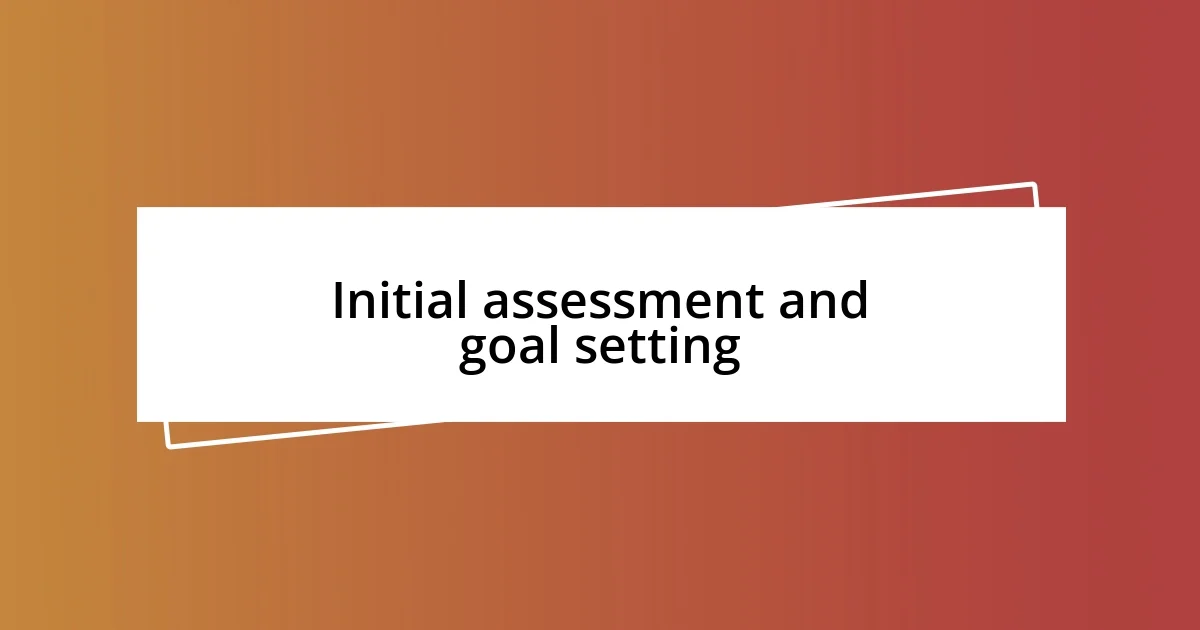
Initial assessment and goal setting
In my experience, the initial assessment is a pivotal moment in nutrition coaching. I remember sitting down with my coach, sharing not just my eating habits but also my emotions tied to food. Have you ever thought about how much our relationship with food influences our goals? It’s more than just calories; it’s about understanding our motivations and barriers.
As we navigated my current lifestyle, my coach encouraged me to articulate my goals clearly. I found myself surprised by how much a few specific words could change my perspective. Instead of vague aspirations like “getting healthier,” I began to frame my goals in tangible terms, such as aiming to have more energy for my evening runs. This shift didn’t just empower me; it made my goals feel real and achievable.
Setting a timeline for those goals was equally crucial. Initially, I was hesitant about deadlines, fearing I might fail. But my coach reminded me that timeframes act like guideposts. They help us track progress and celebrate small victories along the way. Have you experienced the satisfaction of ticking off goals one by one? There’s something incredibly motivating about seen progress, and it’s a feeling I treasure as part of my nutrition journey.
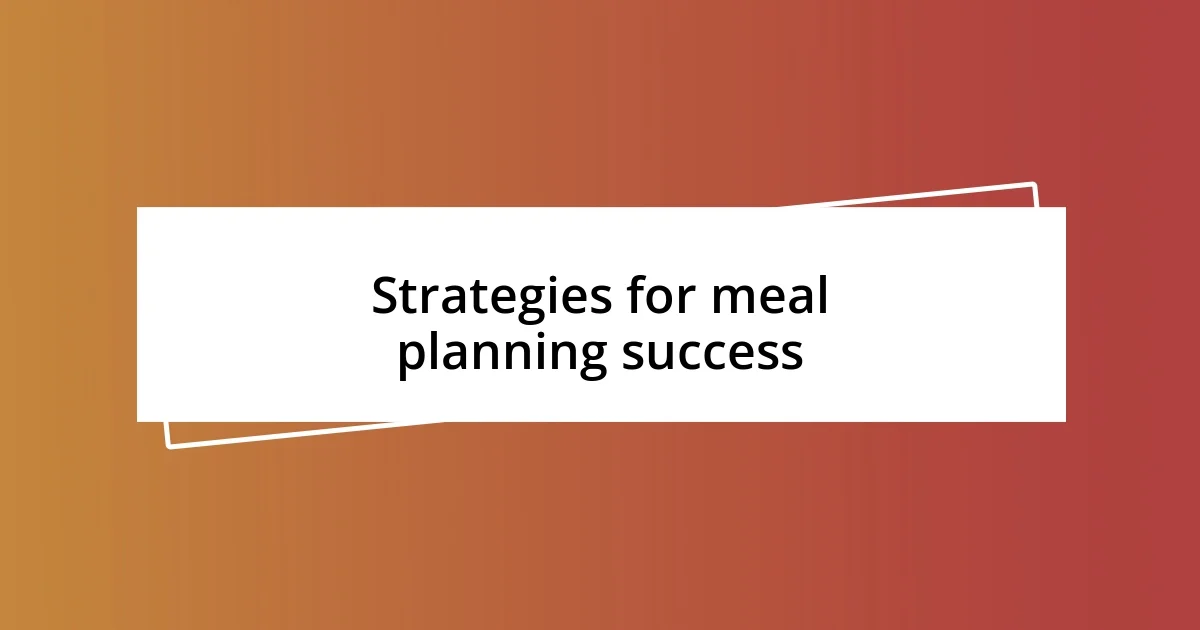
Strategies for meal planning success
When it comes to meal planning, I’ve discovered that flexibility is key. Early on, I meticulously planned every meal and snack, which felt overwhelming and left little room for spontaneity. It didn’t take long for me to realize that occasional changes to my meal prep could make a world of difference. Now, I embrace the idea of having a basic structure while allowing for adjustments based on how I feel or what ingredients I have on hand. This approach has not only kept me engaged in my diet but has also reduced stress during busy weeks.
Here are some strategies that have helped me achieve meal planning success:
- Use a calendar: I block time each week to plan meals, which helps me allocate time without chaos.
- Batch cooking: I often make larger portions of certain meals and freeze portions for later, saving time and energy.
- Incorporate seasonal foods: Choosing fruits and vegetables that are in season makes my meals fresher and more exciting.
- Keep it simple: I focus on recipes with fewer ingredients that still pack a flavor punch, making preparation quicker and less daunting.
- Listen to your body: I check in with myself weekly to tune into cravings and adjust my meal plan accordingly, ensuring that I’m excited about the food I eat.
By experimenting with these strategies, I’ve cultivated a meal planning routine that feels both sustainable and enjoyable, which I think is crucial in the long run.
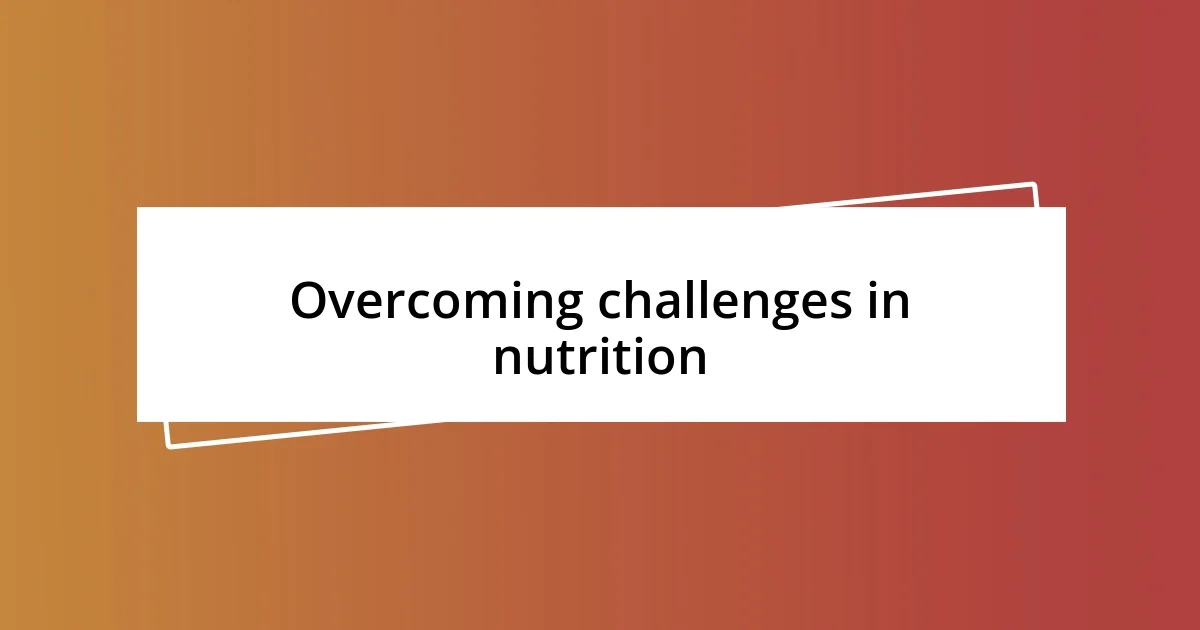
Overcoming challenges in nutrition
When it comes to overcoming challenges in nutrition, I’ve faced my share of hurdles. One of the toughest moments was grappling with my cravings for comfort foods during stressful times. It felt like an emotional tug-of-war, as I craved the taste but deep down, I knew those foods didn’t align with my goals. What I found to be really effective was finding healthier alternatives that satisfied those cravings without guilt. For instance, when I was really in the mood for pizza, I experimented with a cauli-crust recipe. You know what? It didn’t just fill the void; it also became a fun ritual that I looked forward to making.
Another challenge was breaking old habits. When I started this journey, I was stuck in a cycle of mindless snacking at night. It’s easy to reach for a bag of chips in front of the TV, right? However, I discovered that simply replacing the chips with air-popped popcorn or crispy veggies made a remarkable difference. I remember the first time I tried this switch; I was amazed at how much more satisfying a handful of crunchy carrots felt compared to those empty calories. This shift didn’t require a complete overhaul but rather small, manageable changes that gradually led to healthier nighttime routines.
Lastly, how do we navigate social situations that often revolve around food? It’s a challenge I grappled with when friends invited me out to restaurants. I vividly recall one evening at a local Italian spot, where I felt the pressure to indulge in the breadbasket. Instead, I challenged myself to order a lighter dish while savoring the social aspect instead of the food. The thrill of reconnecting with friends while still honoring my goals taught me that it’s all about balance. Each choice became a stepping stone towards healthier habits, proving that nutrition doesn’t have to be restrictive.
| Challenge | Solution |
|---|---|
| Cravings for comfort foods | Experiment with healthier alternatives |
| Breaking old habits | Replace unhealthy snacks with nutritious options |
| Social eating situations | Focus on balance and lighter choices |
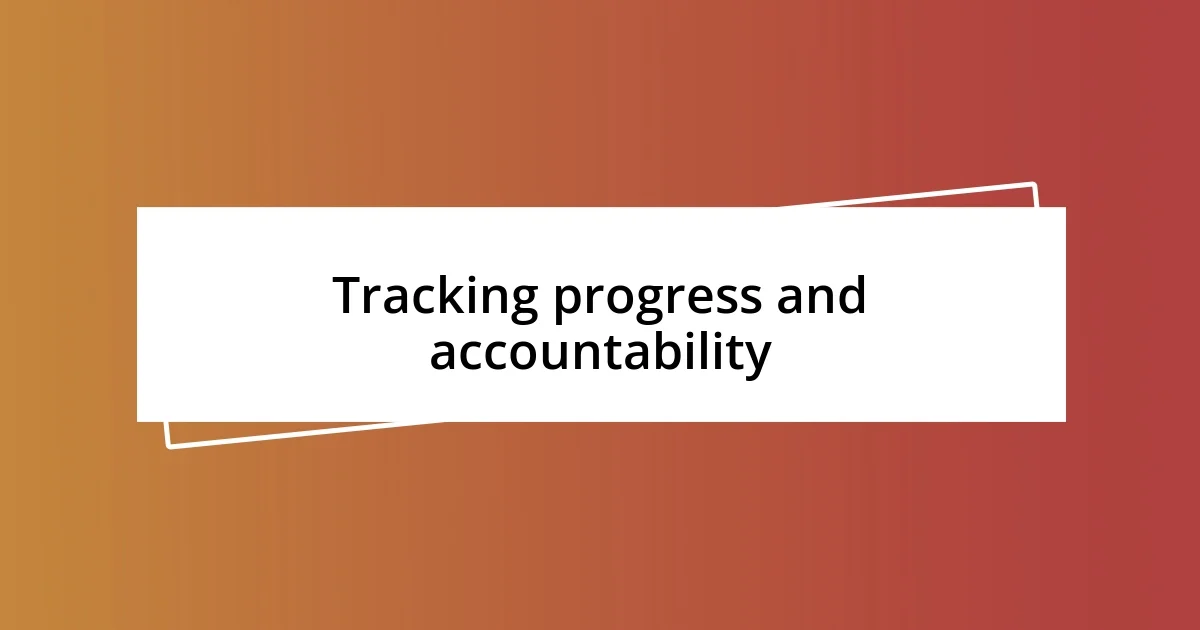
Tracking progress and accountability
Tracking progress has been an eye-opening part of my nutrition coaching. I started by simply logging my meals and workouts, and honestly, it felt tedious at first. But as I continued, I realized it was more than just numbers; it was about recognizing patterns in my eating habits and energy levels. Reflection on this data revealed the impact of certain foods on my approach to life, proving to be both insightful and motivating.
Accountability, on the other hand, has been a game changer for me. I remember setting weekly check-ins with my coach, which felt a bit intimidating initially. But sharing my struggles and victories made the process feel less lonely and more supportive. It’s fascinating how discussing my progress not only held me accountable but also provided a safe space to explore my emotions tied to food choices. Have you ever felt the weight of a shared commitment? It’s quite empowering!
Moreover, I found that having a buddy system helped exponentially. I partnered up with a friend who also aimed to improve her nutrition. It certainly transformed our journey into something more enjoyable and less daunting. We would send each other updates, celebrate wins together, and even share moments of weakness. It was a reminder that we’re all human and that support is invaluable—something I believe can truly elevate one’s success in any health journey.
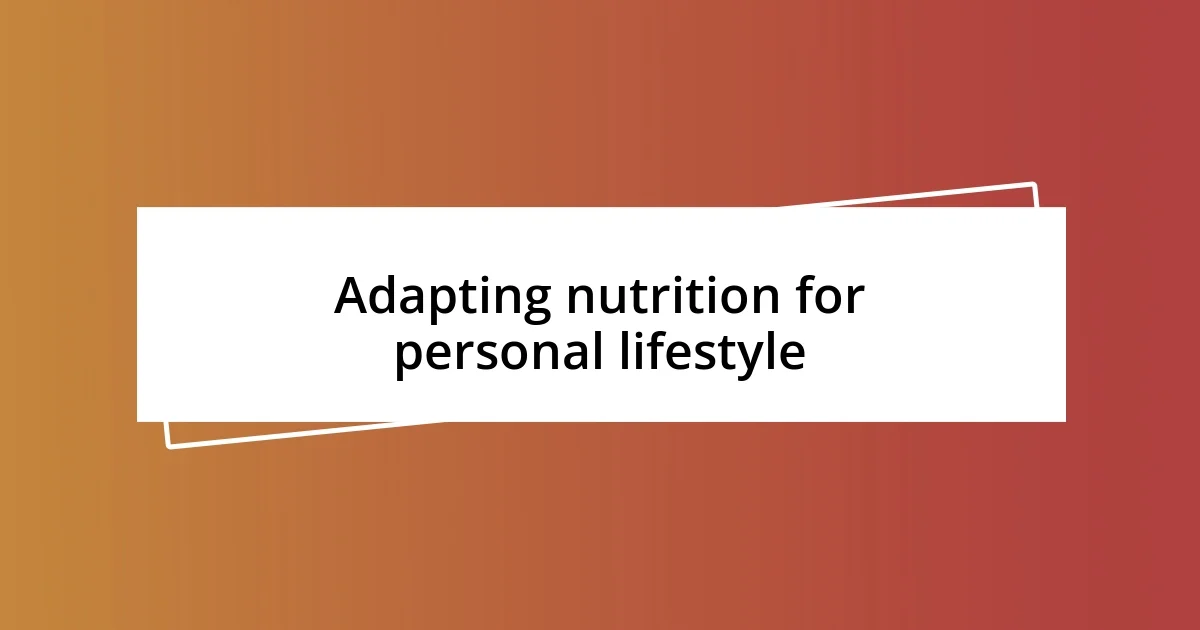
Adapting nutrition for personal lifestyle
Adapting nutrition to fit your personal lifestyle can be a game changer. I remember when I transitioned to a more plant-based diet, which initially felt overwhelming. But instead of rigidly adhering to strict meal plans, I focused on incorporating more vegetables into my favorite dishes. It was liberating to discover that simple swaps—like adding spinach to my morning smoothie or using lentils in pasta sauce—could still satisfy my cravings while aligning with my health goals.
Another aspect of adapting nutrition is understanding your daily rhythm. For instance, I’m not a huge breakfast person, and forcing myself to eat first thing in the morning felt unnatural and forced. Instead, I began to listen to my body and opted for a hearty mid-morning snack that kept my energy up without the stress of a traditional breakfast. Have you ever considered what feels right for you instead of following societal norms? Doing so has made my approach to nutrition so much more enjoyable.
Lastly, managing my social life while keeping my nutrition in check became an interesting challenge. I once attended a friend’s birthday party where the buffet was a feast of indulgent foods. Instead of feeling guilty for wanting to enjoy the spread, I decided to focus on the delicious aspects of moderation. I remember choosing just a few bites of my favorites, indulging while still being mindful. This mindset transformed the event into a celebration of food and friendship rather than a battle of willpower. It made me realize that adapting nutrition is really about creating a joyful experience that suits my lifestyle without feeling deprived.
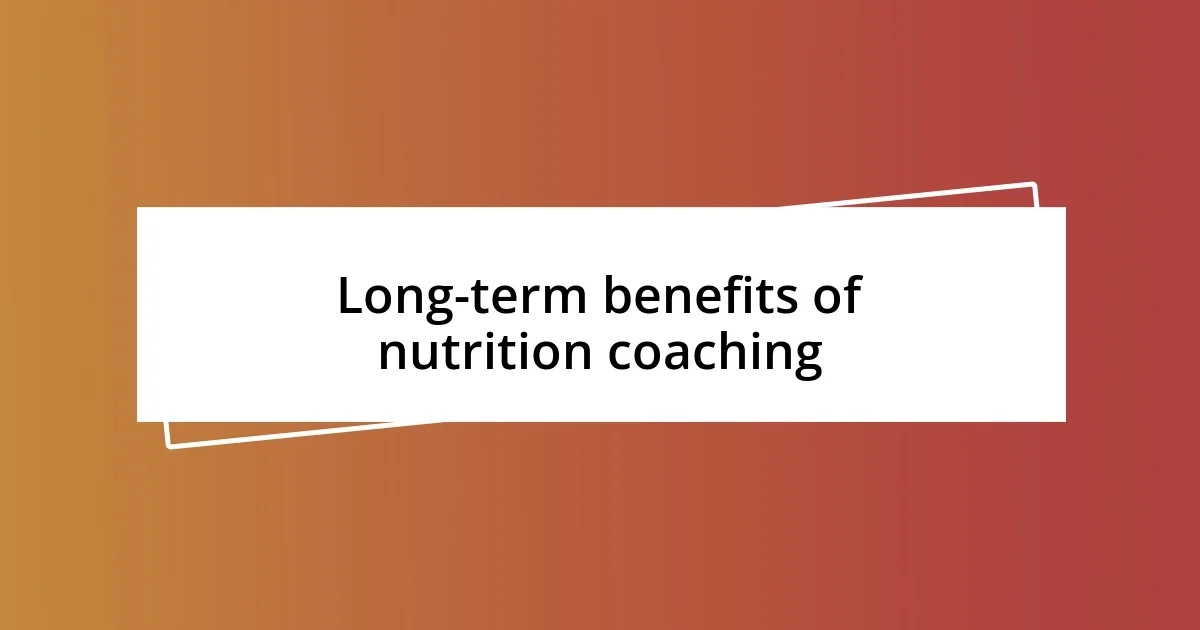
Long-term benefits of nutrition coaching
One long-term benefit of nutrition coaching is the development of sustainable habits. After working with my coach, I slowly began to shift my mindset about food. I recall a moment when I didn’t feel like counting calories anymore; instead, I focused on choosing whole, nutritious foods intuitively. Have you ever felt that shift from a rigid diet to a more flexible lifestyle? It’s truly freeing when you realize healthy eating can just be a part of daily life rather than a chore.
Improved energy levels have also been a remarkable change for me. I used to experience energy crashes midway through the day, often reaching for sugary snacks to get through. After implementing the strategies from my coaching sessions, I noticed my body responded positively to balanced meals, providing me with consistent energy. I remember one busy afternoon where I felt energized and focused instead of fatigued. How would it feel to maintain that energy without relying on caffeine or sugar? This newfound vitality makes each day more vibrant and productive.
Lastly, fostering a positive relationship with food has been a profound long-term transformation. Initially, I had an all-or-nothing attitude that left me feeling guilty after indulgences. Through coaching, I learned that it’s possible to enjoy my favorite foods without the associated guilt. I vividly remember savoring a slice of chocolate cake at a family gathering. Instead of berating myself for it, I embraced the moment. How refreshing is it to celebrate food as something that nourishes both body and soul? These shifts create a lasting appreciation for food that fuels not just my body but also my life experiences.













